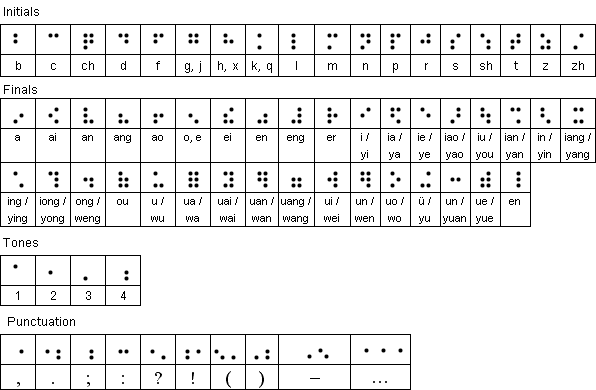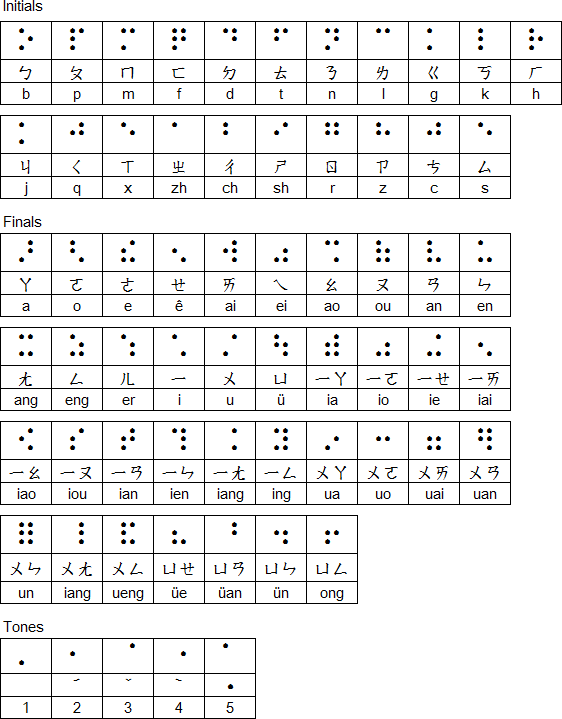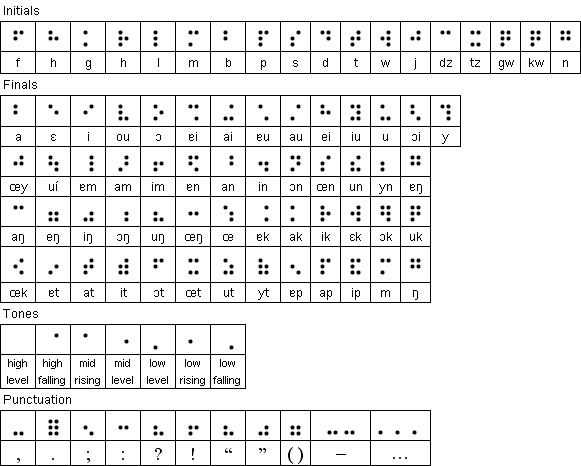When Braille is used to write Chinese, it represents the sounds of the language rather than the characters. It is written from left to right in horizontal lines running from top to bottom. Each syllable is made up of three Braille letters: one for the initial, one for the final and one for the tone, though the tones marks are rarely used. Words are separated by spaces. Where there is no possibility of confusion, some initials are written in the same way. For example g and j, and h and x in Mandarin Braille.
In Chinese Braille is known as 盲文(mángwén - “blind writing”), 点字 [點字] (diănzì - “dot script”), 盲字 (mángzì - “blind script”) or 凸字 (tūzì - “protruding script”).
This is the version of Braille used to write Mandarin in China.


Source: www.braille.ch/pschin-e.htm
This is the version of Braille used to write Mandarin in Taiwan.


Source: www.ntl.edu.tw/ct.asp


Source: www.hadley-school.org/Web_Site/8_d_chinese_braille_alphabet.asp
Free Braille fonts
http://www.tsbvi.edu/Education/fonts.html
Braille for Chinese (Mandarin & Cantonese), Braille for English, Braille for Latin & Greek, Braille for Welsh
Braille for Chinese, Braille for English, Braille for Latin & Greek, Braille for Welsh, Moon, Fakoo, Quadoo, Siekoo
Written Chinese: Oracle Bone Script, Simplified characters, Bopomofo, Types of characters, Structure of written Chinese, Evolution of characters, How the Chinese script works, Xiao'erjing, General Chinese
Spoken Chinese: Mandarin, Dungan, Wu, Shanghainese, Wenzhounese, Yue, Cantonese, Weitou, Min, Jian'ou, Taiwanese, Teochew, Fuzhounese, Puxian, Hakka, Xiang, Gan, How many people speak Chinese?
Other Chinese pages: Chinese numbers (數碼) | Chinese classifiers (量詞) | Electronic dictionaries | Chinese links | Books: Chinese characters and calligraphy | Cantonese | Mandarin, Shanghainese, Hokkien and Taiwanese
Akkadian Cuneiform, Ancient Egyptian (Demotic), Ancient Egyptian (Hieratic), Ancient Egyptian (Hieroglyphs), Chinese, Chữ-nôm, Cuneiform, Japanese, Jurchen, Khitan, Linear B, Luwian, Mayan, Naxi, Sawndip (Old Zhuang), Sui, Sumerian Cuneiform, Tangut (Hsihsia)
Page last modified: 15.03.23
[top]
You can support this site by Buying Me A Coffee, and if you like what you see on this page, you can use the buttons below to share it with people you know.

If you like this site and find it useful, you can support it by making a donation via PayPal or Patreon, or by contributing in other ways. Omniglot is how I make my living.
Note: all links on this site to Amazon.com, Amazon.co.uk
and Amazon.fr
are affiliate links. This means I earn a commission if you click on any of them and buy something. So by clicking on these links you can help to support this site.
[top]